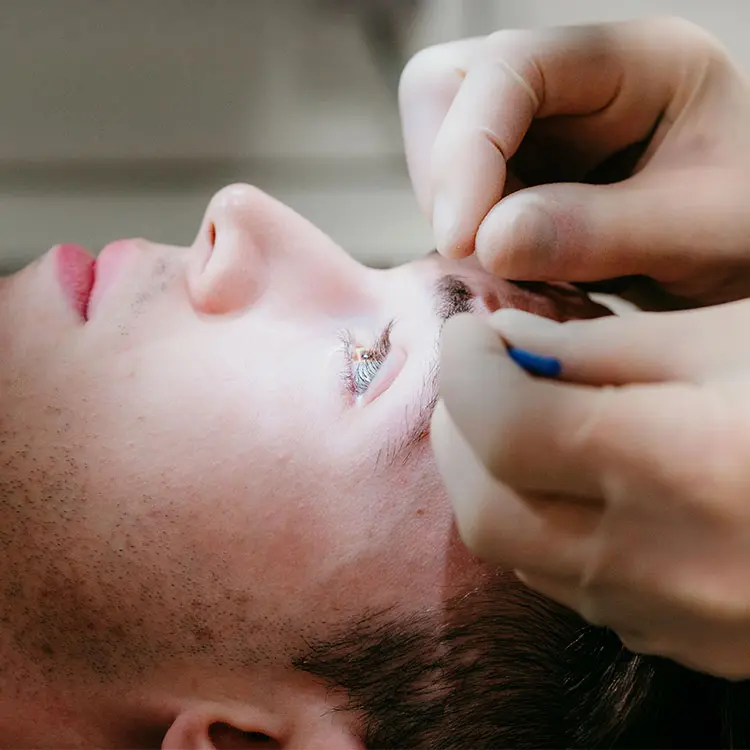
EYE SURGERY
Refractive Cataract Surgery
Cataract surgery is one of the oldest surgical procedures recorded, and fortunately for us, over the years technological advances have made it one of the safest and most frequently performed procedures worldwide.
Treatment at a glance

TREATMENT TIME

ANAESTHETIC

DOWNTIME

LONGEVITY

KEY BENEFIT
Quick & Painless
All About Cataract Surgery
Cataract surgery is a surgical procedure to remove the cloudy natural lens of the eye (the cataract) and replace it with an artificial lens, or intraocular lens implant (IOL).
Lens implants are specially engineered to provide focussing power to suit the individual, and this means that lots of patients who have cataract surgery find that they are less reliant on glasses, especially for distance, than they were beforehand.
The procedure usually takes about 10-15 minutes to do under a local anaesthetic, and isn’t painful. There is usually a swift recovery of vision.
During refractive cataract surgery, advanced femtosecond lasers are used to soften the cataract and break the cloudy lens into pieces. The clouded lens pieces are then gently suctioned off of the outer eye lens.
Cataract surgery outcomes have greatly improved due to advancements in surgical technique, intraocular lens (IOL) technology, and preoperative testing and calculations.


FREQUENTLY ASKED QUESTIONS
A Cataract is a where the normally clear lens of the eye, which is just behind the iris, the coloured part of the eye, becomes cloudy. As the lens becomes more cloudy, it becomes rather like looking through a frosted glass window. A cataract is inside the eye and not a skin that grows over your eye, so needs very delicate surgery to remove and replace.
The surgeon performing your operation is a very important factor for success. Mr Toor has been performing cataract and lens surgery for over 10 years, and has a huge amount of experience, having performed many hundreds of cataract procedures over the years. He is often asked by colleagues to carry out surgery on their relatives.
Mr Toor uses only the latest technology and lens implants, and unlike other clinics, Mr Toor will see you personally at the consultation, and he will carry out and supervise every aspect of your care. Living locally means that Mr Toor can arrange to see you promptly if needed.
You do not need to wait for the lens to become ‘ripe’ and each patient is treated as an individual with a through assessment by the Warwick Eye Surgeons team. Early lens changes may not disturb vision, although this will change as the cataract progresses. Each person can have a different rate of progression which is very difficult to predict. Most people report symptoms including blurred vision, sensitivity to light and glare, increased nearsightedness or distorted images as the cataract progresses.
Nearly half the population of people in the UK aged 65 and 70% of those aged 75 and over have cataracts. The cause in most patients is advancing age, although they can also result from eye injuries, diabetes, medication (such as steroids), or genetic factors. Currently, there are no medications or treatments that will cause cataracts to get better. If cataracts don’t interfere with your life then we will help guide you to the best course of action, which may not mean surgery.
When cataracts interfere with your daily life, surgical treatment is often recommended. Cataract surgery is the most frequently performed operations within the NHS, and advances in technique make it very safe and effective.
You may feel a gentle pressure during the flap creation process which usually lasts about 30 seconds.
The vast majority of patients have no pain but some may feel a little grittiness in the eyes for a couple of days.
You will be given a set of eye drops to take at home that vastly reduce the risk of infection and inflammation. These generally last for the first 4 weeks but some patients may require lubrication drops for the first few months.
Cataract surgery risks include:
- Swelling.
- Infection.
- Bleeding.
- Drooping eyelid.
What Clients Say
 Linda Bennett2023-09-15Very easy to access warwick eye surgeons with timely appointments.Mr Toor was Extremely proffessional with an easy and approachable manner.Despite a non urgent eye problem I felt I was listened to and offered appropriate advice & treatment .
Linda Bennett2023-09-15Very easy to access warwick eye surgeons with timely appointments.Mr Toor was Extremely proffessional with an easy and approachable manner.Despite a non urgent eye problem I felt I was listened to and offered appropriate advice & treatment . Sarah Hession2023-05-23Professional and very through care. Clear advice from Mr Toor the consultant.
Sarah Hession2023-05-23Professional and very through care. Clear advice from Mr Toor the consultant. Lyn Kennedy2023-03-31This is my second encounter with Mr Toor, firstly for cataracts and now another problem; I could not be happier with the outcome. Thank you.
Lyn Kennedy2023-03-31This is my second encounter with Mr Toor, firstly for cataracts and now another problem; I could not be happier with the outcome. Thank you. Mike O'Brien2023-03-27Felt at ease throughout the consultation. Everything was explained before and during the examination.
Mike O'Brien2023-03-27Felt at ease throughout the consultation. Everything was explained before and during the examination. Sohail Butt2022-11-18A Comprehensive review of my eye condition with the Consultant having the time to discuss the case in detail
Sohail Butt2022-11-18A Comprehensive review of my eye condition with the Consultant having the time to discuss the case in detail Jon Radford2022-11-08Very professional, everything explained clearly and thoroughly. 2 operations organised quickly and very comfortable experience. Excellent outcome as well.
Jon Radford2022-11-08Very professional, everything explained clearly and thoroughly. 2 operations organised quickly and very comfortable experience. Excellent outcome as well.

